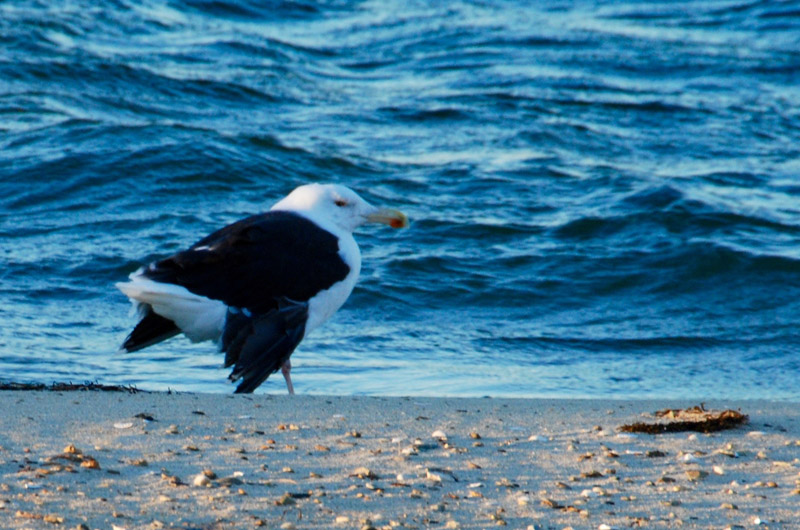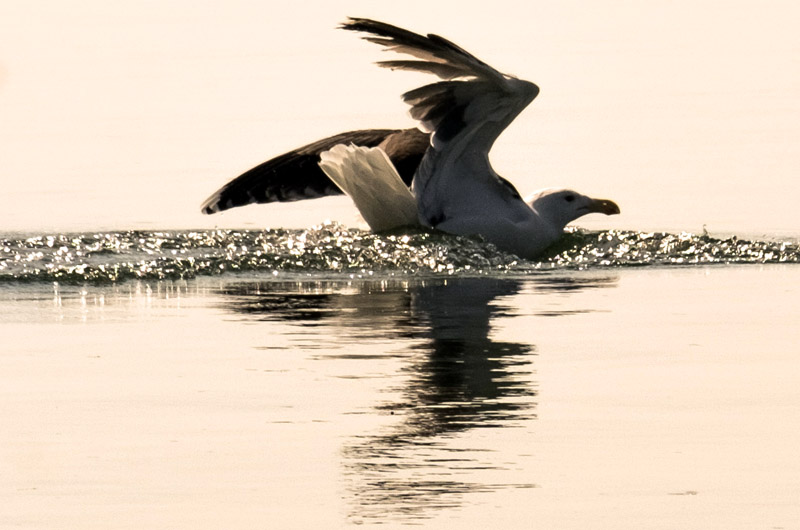Word has come down from on high: If you’re a wounded gull, the place you want to seek refuge and rely on the kindness of islanders is Chappaquiddick Point, right where the ferry lands.
Since the final two weeks of the striped bass and bluefish derby in the middle of October, a grown-up black-backed gull with a broken right wing has made Chappy Point his home. During the coldest, windiest early mornings this winter, he has been seen sheltering in the lee of the bulkhead of the spare ferry slip. Late at night, he becomes a specter standing far off at the shoreline, dimly lit by an overhead light, gazing with one eye at the On Time III as it lands and departs.
Going back 20 years, he (or perhaps she) is the fourth black-backed gull with a busted wing to make Chappy Point his Shangri-La. Three of the four gulls were hurt when they went after the bait of anglers fishing off Edgartown Memorial Wharf and got hooked or entangled in the lines.

The first victim was a mature black-back who soon found a home and handouts at the point back in 1996. Depending on where you asked, he had different names, which showed that although he could no longer fly, he still got around. Workers at North Wharf on the Edgartown side of the harbor called him Lefty. Staff at the Edgartown Yacht Club called him Lucky. At the Point they kept it simple: Broken Wing or BW for short. The second was a gull called Ditto, a contemporary of Broken Wing’s who came along just a little later. The third was a yearling black-back who was hurt this fall, just as he was learning to fly, and who despite the best efforts of Capt. Bob Gilkes of the Chappy ferry and others to keep him fed, starved shortly thereafter. The surviving black-back this winter is an adult. He too was injured after fouling a fisherman’s line at Memorial Wharf. When he stands still, the tip of one wing splays. He can still fly low over the water for 20 seconds or so, his primary feathers on one side flapping out of rhythm with the rest of his wing. The only thing this latest afflicted gull does not have, so far as Captain Gilkes is concerned, is a name.
“When Broken Wing got run over, I had to become detached,” he said as he skippered the ferry one recent night. “I do plan on featuring him on my business card, though.”
The story of Broken Wing’s demise is a difficult one to tell. Smart about dogs and other marauders, he was also able to identify cars to which he could walk up and reliably expect bait and scraps. From a few donors on foot, he’d even take food from the hand. But one day he let his guard down, and a Chappy resident drove a jet-black Thunderbird off the ferry and ran over him. Word spread across Chappy, the island mourned and Captain Gilkes took the body home and buried it in his back yard.
Ditto, an adolescent contemporary of BW whose own wing looked like it had been roughly clipped, learned from the older gull and also took food. During the time the two birds shared the point, other gulls witnessed the act. They thought things over, conferred a bit and then settled in, dragging a wing around the ferry and hoping to pick up donations of their own.
These days, every few nights, Captain Gilkes offers thawed mackerel and squid to the latest black-back, proving he may not be as detached as he claims. Chappaquiddickers traveling to and from the island during the day also give him leftovers. Perhaps taking a cue from BW, winging now unhampered somewhere in the great beyond, this gull moves away when approached, and the skipper has never seen the bird eat from anybody’s hand. For which Captain Gilkes is glad.
“He’s wary of everybody. He’ll pay attention if I call. He’ll turn and look at me. And I don’t want him to [feed out of my hand] because of all the dogs and other creatures that are running loose around here. It’s amazing he’s made it this far.”
The gull isn’t entirely dependent on people for food. Observers have seen him dig up shellfish along the wrack line. “When the shiners and stuff are around, he gets right in there,” said Captain Gilkes. “When the great blue heron comes in, he stations himself between the great blue and the beach. He’s gotten savvy enough that the fish will swim around the great blue and come right to him.”
Being bigger and a bit more narrow-eyed, black-backs don’t naturally appeal to people the way pearl gray herring gulls do. Black-backed gulls are thought of as mean, killing eiders and drowning competitors and tearing up the rookeries of other birds like German Stukas. But nature has a way of finishing off hobbled animals without regard to human feeling, and it’s surprising that most of the gulls taking refuge at Chappy Point have hung on as long as they have.
Captain Gilkes puts it down to toughness. “They’re tenacious and they’re survivors,” he said. “Besides that, they’ll eat just about anything.”
He has also come to think of the feeding of the gulls as a kind of recompense. When one or two of these birds were ensnared, the fishermen hauled them onto the wharf and treated them roughly, he said. To him, feeding the victims is “our latest iteration of how to take something that’s really ugly and trying to make something good out of it.”








Comments (10)
Comments
Comment policy »